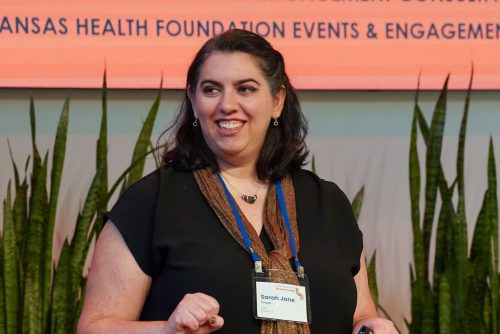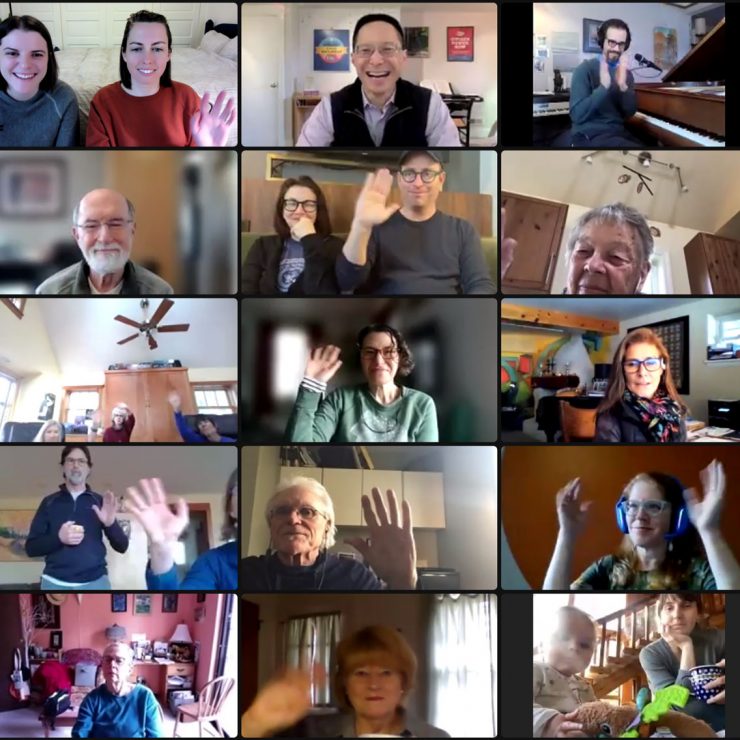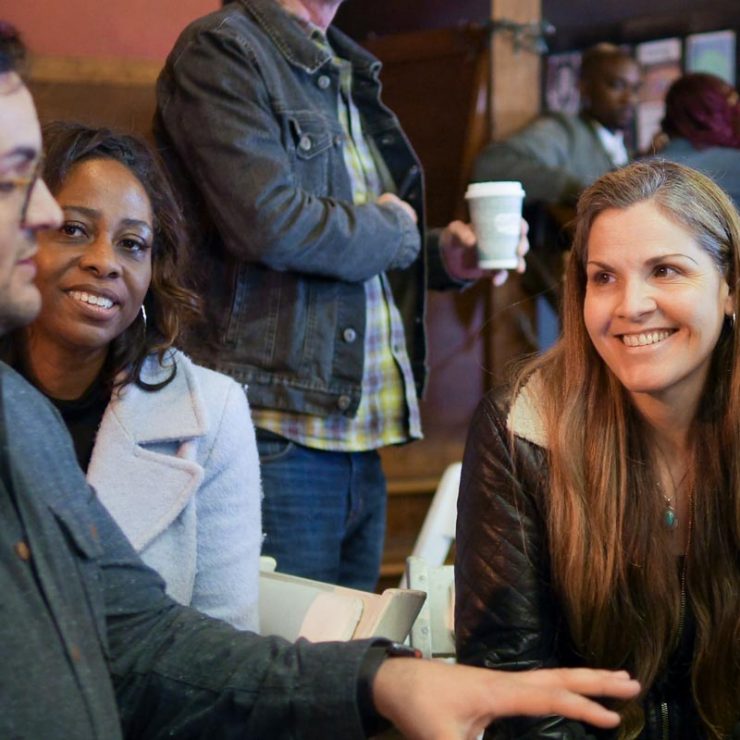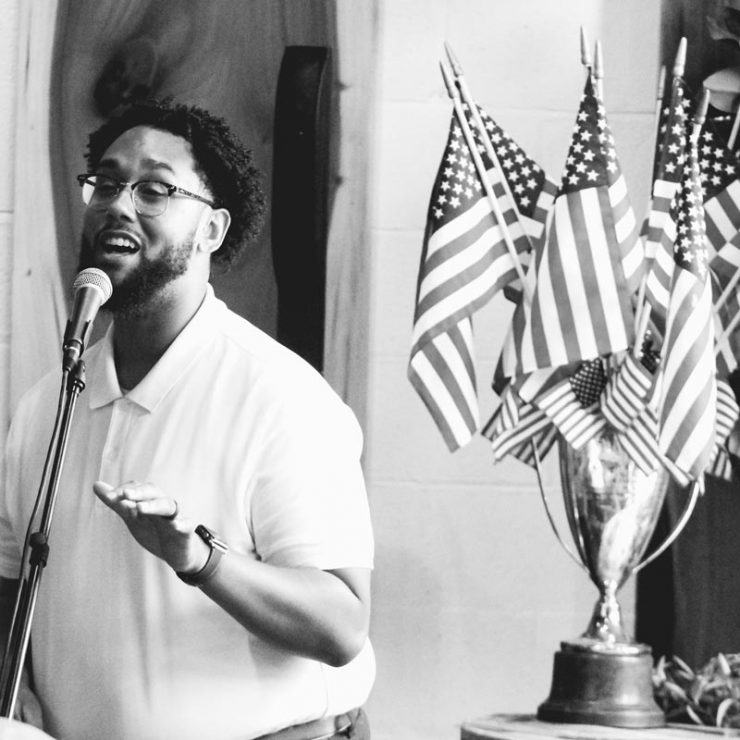Sarah Jane Crespo, a Civic Saturday Fellow, wrote and shared the following civic sermon for a “Civic Tuesday” gathering in Wichita, Kansas.
This gathering, organized with Fellow Maren Berblinger, was a collaboration between the Kansas Health Foundation and the Kansas Leadership Center, aimed to nourish the craving for more tangible ways to be effective when engaging in civic life. Get a peak into their gathering with this video…
Impact & Legacy
We’re getting into the winter holidays now, and in many traditions, this is a time for reflection. Darkness settles over us and we are left with our thoughts. Nights are long and quiet. When it snows, it’s like you can hear more. The world goes still. Just like how, when the sky is darkest during the new moon, you can see more stars. Darkness allows us to perceive more — to understand more — if we take that pause and open up our senses to bigger perspective.
At the same time, there are fewer resources. Creatures die of cold or hunger or go to sleep hoping to awaken to a gentler spring. We people collectively slow down too. But without groups of kind-hearted human beings, many would suffer even more. We fill backpacks with food, we donate canned goods and mittens and coats. We make more monetary donations to causes that address basic needs. Out of this darkness, comes the reminder that we are not here in a vacuum.
We are individuals who exist within community, and by taking care of one another, we take care of ourselves.
As we were preparing for this event, I had a conversation with Maren, who happened to tell me that It’s a Wonderful Life was one of her favorite movies as a child — so much so that she watched it several times a week all year round. She loved seeing a depiction of how small things make incredible impacts that we never get to see. If we weren’t here, being good to one another, what kind of world would it be? It’s unfortunate that many people have begun to believe that their efforts are useless.
As a mother, it’s hard to explain to my son why this world is so bitter as well as so sweet. You can say, and many do, that without the bitterness we would not appreciate the sweetness. But I think there’s more to it than that. To me, it’s more about seeing the bitter and the sweet both, as signs of our purpose. We are self-aware animals who can look around and see how the world is at odds with itself. We get to choose to build or to destroy. To use or to give. The juxtapositions in life are invitations to choose. Life is painful, and it is wonderful.
Citizen University is particularly good at holding opposing truths together. It is possible to fervently love our country and still to see its flaws. We can love ourselves even though we are not perfect. We can live in community with each other even though at times we hurt each other. Maybe it’s about boundaries, in addition to hope.
It is possible to fervently love our country and still to see its flaws.
This year I’ve been asked to speak seven times about bridging divides in our country. I’ve facilitated many, many conversations between people on the political left and the political right for StoryCorps’ One Small Step initiative. And so often, there’s a kind of brightness that settles over the room, about thirty minutes into those conversations. There’s a shift in the air. I talk about the invisible dominoes that I can hear – or feel – falling as a result of the honesty, curiosity, and vulnerability displayed by these strangers. People see one another in a new light. We leave, and get on with our lives, feeling a bit more hopeful.
I recently came back from Citizen University’s Homecoming event in Seattle, where I got to meet many other Civic Saturday Fellows. It was a weekend of joy and new connections, while underneath — for many — was deep sorrow. One of Citizen University’s founders, Jená Cane, had recently passed away. Her grown daughter Zoey was there, bringing people together and helping us all break through the tidy facades that people usually show one another in those situations…to access what’s emotional and real underneath.
We really saw one another and we really made friends — not just professional contacts. Jená was alive in her daughter. Jená’s husband Eric, Citizen University’s other founder, spoke in her honor. Jená’s legacy was alive in his words. Jená’s spirit of hope and love impacted the whole group. Because of Jená — a woman I never even met — I’m here in front of you today. Jená lived authentically and made unimaginable, unseeable impact by following her vision. What if all of us lived that way?
When we talk about “civic faith,” I think it means having a belief in other people — that they not only are capable of doing what’s right for themselves and those around them — but that they are likely to do so. Having faith in each other is a powerful self-fulfilling prophecy. What if we shifted away from combativeness, toward conversation? What if we remembered that every choice we make will domino into the world? Would we live more authentically? Would we follow our visions and let things fall into place?
Having faith in each other is a powerful self-fulfilling prophecy.
Maybe it’s simultaneously true that we are hateful and loving. It’s simultaneously true that we are separate and that we are one. Winter is harsh and soft. Our lives are terrible and so beautiful. It’s Schrodinger’s Country. The thing about the Schrodinger’s Cat experiment though, is that the outcome manifests when the observer checks to see what happened. It’s about actually looking. And as anyone who is even vaguely interested in quantum physics knows, we have influence on what we see when we look.
There are survey results coming back from Wichita (after a few years of having One Small Step conversations here) about how people feel about those on the other side of the political divide. The results are hopeful. This is us looking, and seeing more reason for encouragement. Civic health isn’t something that happens to us. It’s something we make. And it requires civic faith — faith in each other — to get us there. Because those dominoes that are falling are invisible.
We don’t have big enough perspective to know how this plays out. But, what if we lived knowing that both our actions and our hope impact the world? What kind of legacy would that leave? What kind of world would we create? In this season of reflection, if we are still enough to listen, we’ll know that it’s time to find out. And it’s time we did it together.
Learn more about the Civic Saturday Fellowship and you can organize gatherings like these in your community.




